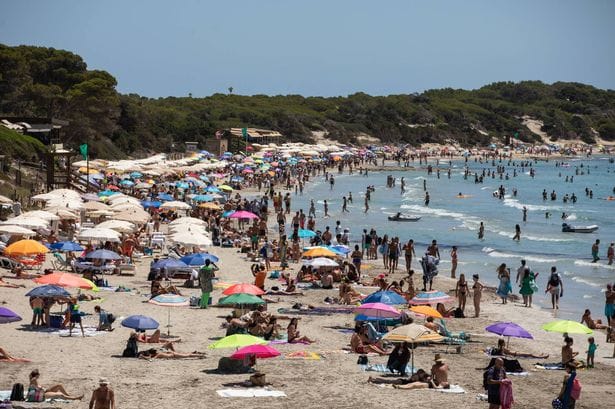A British expat living in the holiday hotspot has issued a warning to tourists visiting the popular destination, after he said his ‘eyes were opened’ to how sophisticated the scams can be
An expat living in Ibiza has issued a warning to Brits about common scams that target tourists and the key phrases holidaymakers should be wary of.
The Spanish island is a favourite holiday destination, renowned not only for its vibrant nightlife and party scene, but also for its stunning beaches. Each season, it draws a massive influx of tourists, and James Smith, a Spanish teacher and founder of Learn Spanish with James, warns that visitors are easy pickings for local fraudsters.
These con artists employ everything from sham boat parties to counterfeit holiday rental adverts in an attempt to swindle money from tourists.
READ MORE: Ryanair passenger ‘quite scared’ on Stansted flight following ‘technical issue’READ MORE: ‘I was denied boarding at airport over glaring issue with burgundy passport’
“Living in Ibiza opened my eyes to how sophisticated these scams have become,” reveals James.
“The scammers know exactly what buttons to push with British tourists, promising VIP treatment, exclusive access, or once-in-a-lifetime experiences. But there are always telltale signs if you know what to look for.” According to James, these are the six most prevalent scams in Ibiza, reports the Manchester Evening News.
Fake club tickets
One of the oldest tricks in the book involves fraudsters approaching tourists with “discounted” tickets to top clubs like Amnesia or Pacha. These tricksters often lurk around popular hotels or loiter at beach bars during sunset.
“They’ll show you what looks like a genuine ticket and claim they can’t use it,” warns James. “The story is always the same: they’re leaving the island early, their mate cancelled, or they double-booked. But these tickets are either completely fake or already used.”
Warning signs include sellers who won’t let you examine the ticket closely, refuse to provide contact details, or pressure you to buy immediately with phrases like “last chance” or “someone else is interested”.
Bogus boat parties
Boat party scams have surged in recent years, with fraudsters setting up fake social media pages and websites advertising non-existent events. They’ll post professional-looking photos and promise celebrity DJs, unlimited drinks, and VIP treatment.
“These scammers are getting smarter with their online presence,” cautions James. “They’ll steal photos from legitimate boat parties and create convincing websites. But when you turn up at the supposed departure point, there’s no boat – and no refund.”
Watch for vague meeting locations, requests for full payment upfront via bank transfer, and reluctance to provide official booking confirmations or company registration details.
Overpriced drinks packages
Street sellers often approach tourists with laminated cards advertising drinks packages for popular venues. They’ll claim you can skip queues and get unlimited drinks for a fraction of the normal cost.
“The legitimate venues don’t work this way,” James points out. “Real clubs sell their own packages through official channels. These street sellers are either selling fake vouchers or massively overcharging for basic entry.”
Timeshare presentation traps
Ruthless sales teams prey on holidaymakers with promises of complimentary dinners, boat excursions or club access in return for attending a “brief” presentation. What begins as a half-hour discussion can escalate into hours of relentless sales pressure.
“I’ve seen tourists lose thousands on timeshare deals they signed under duress,” says James. “The salespeople are trained to create urgency and make you feel like you’re missing out on a once-in-a-lifetime opportunity.”
Accommodation bait and switch
Fraudulent holiday rental adverts have become increasingly clever, utilising pilfered photographs and fabricated reviews to trick tourists into handing over deposits for properties that are non-existent or bear no resemblance to the description.
“Always verify the property through multiple sources,” advises James. “If someone is pushing for immediate payment or won’t video call to show you the property, walk away.”
Transport overcharging
Rogue taxi drivers and bogus airport transfer operators routinely fleece tourists, particularly those arriving during the early hours or whilst intoxicated.
James has also cautioned holidaymakers about specific phrases employed by fraudsters to manipulate tourists. This includes: James advised: “Living in Ibiza taught me that scammers specifically target British tourists because they know they’re often unfamiliar with local customs, and language barriers can make visitors more vulnerable.
“The key is preparation: know the Spanish phrases for ‘no thank you’ and ‘I’m not interested’, and don’t be afraid to use them firmly.
“Before you hand over any money, always ask for official documentation, a receipt, and contact details. Legitimate businesses will happily provide these. If someone starts getting aggressive or evasive when you ask basic questions, that tells you everything you need to know.
“The simplest check you can do is ask them to write down exactly what you’re buying, when and where it’s happening, and their contact information. Watch how they react – genuine sellers will do this without hesitation, while scammers will usually make excuses or try to rush you into paying immediately.”
